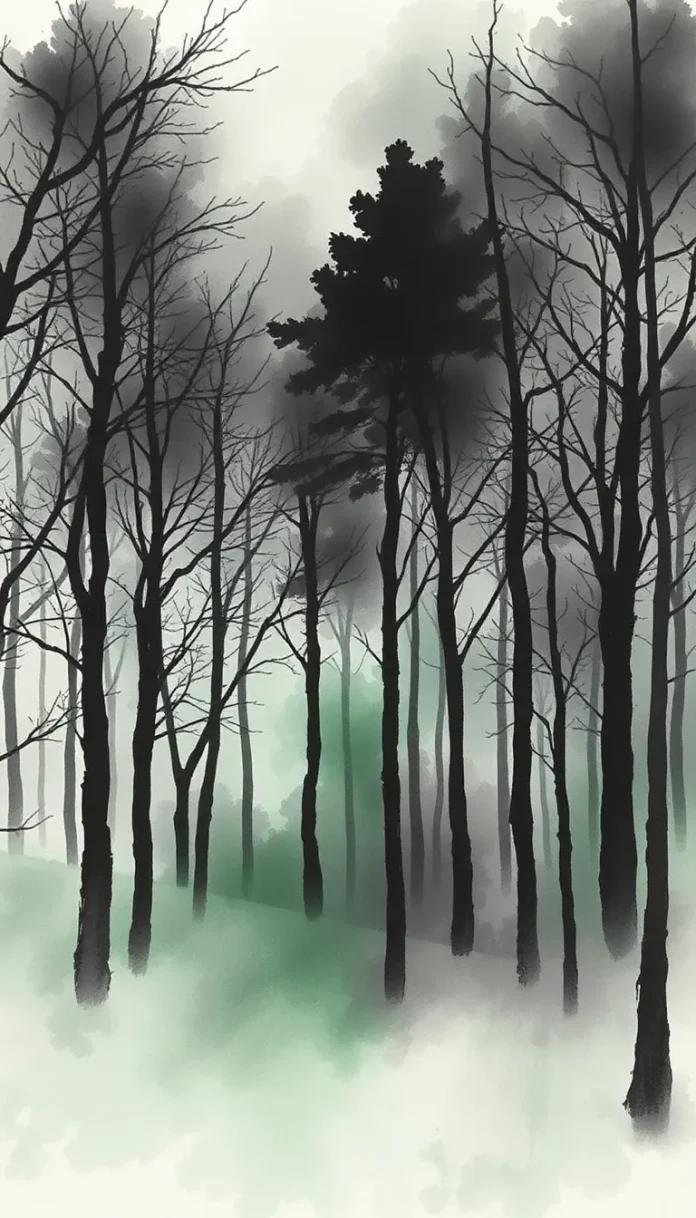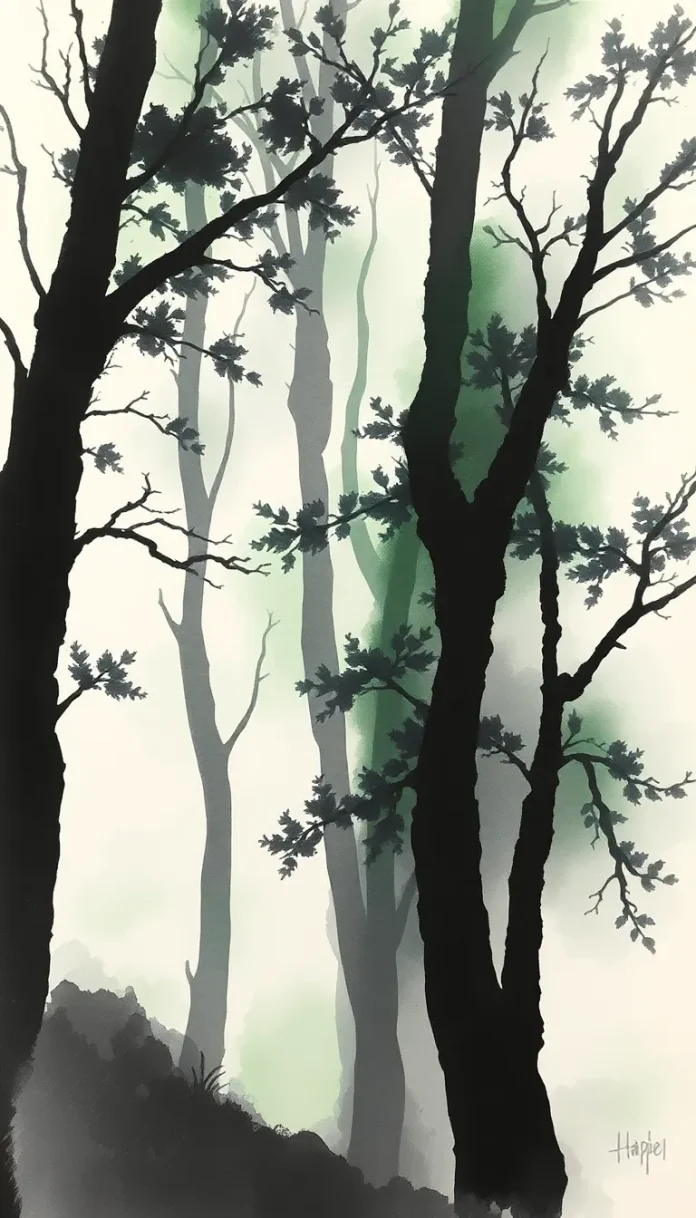Fidelity of Fate in the Abandoned Chapel
Beneath a fading sky of indigo and melancholy gray, Fidèle roamed the edifice’s crumbling halls, each footfall resonating with an inner dirge. His eyes, tired yet resolute, surveyed the vacant altar, the array of shattered stained glass windows, and the dust that lay like a ghostly shroud upon every surface. There in this silent ruin, the immutable hand of fate mingled with the echoes of human frailty, and a tragic narrative began to unfurl.
I
In the silent corridor of memory and despair, Fidèle’s thoughts did wander. “Am I but a vagabond upon the pathways of an inescapable fate?” he murmured, his voice a soft intonation that merged with the sighing winds. In the forsaken gloom, where light and shadow waged their eternal duel, his introspective lament was interwoven with the rustling whispers of history. Each carved stone was a silent witness to the relentless trials of mortal existence, a chronicle on the limits of hope and the inevitability of decay.
II
As the dusk deepened, shadows danced along the cold, damp walls, and time itself seemed to huddle in mourning. Fidèle advanced through the skeletal remains of once-sacred halls, pondering the unyielding condition of human life in the face of destiny’s immutable decree. “I am every man,” he thought, his inner dialogue echoing in the hollows of solitude. “I am the seeker of truths, the bearer of sorrows, and the mourner of dreams lost in the twilight of my spirit.” With each fragile step, he acknowledged that the strut of mortal endeavor was but a fleeting tremor upon the vast ocean of fate.
III
In a quiet corner of the chapel, beneath a decaying fresco lit by a lone shaft of moonlight, the figure of Fidèle paused. Before him lay a weathered diary, an artifact that might hold the whispers of those who had trodden these ancient floors. His trembling fingers brushed against the leather binding, and as he unfurled its brittle pages, a cascade of memories flooded his soul. The diary spoke of passions and disappointments, of lives entwined in a dance of sorrow and ephemeral joy—a literary relic perhaps penned by another soul much like his own. It was written in the elegant hand of a long-forgotten poet, who had too discovered the inexorable cruelty of destiny and the all-consuming nature of human frailty.
IV
“Herein lies the verity of our condition,” Fidèle mused, as his eyes traced the ink-stained lines with reverence and despair. Each word, each elegantly wrought syllable, resonated with a profound melancholy; a testament that our existence is imbued with beauty only by its fleeting fragility. In those moments, the deserted chapel transformed into a cathedral of forlorn souls, where every echo recounted the fleeting aspirations of hearts both brave and broken. The dusty air seemed to whisper: “Tomorrow yet may come, yet in the end, sorrow awaits all.”
V
The night deepened, and Fate itself appeared in manifold guises. Flickers of memory, like phantoms, roamed the ruined aisles, the shattered murals drawing spectral silhouettes against the stonework. A voice, soft and indistinct, intermingled with the distant sound of a lone violin echoing through time. “Fidèle,” it seemed to call, “can you not discern the paradox of our existence? We are ever entangled in the pursuit of ephemeral elevation, even when our fates are predetermined by despair.” It was as though the chapel, in its abandoned majesty, was both custodian and confessor of the human plight.
VI
A dialogue—a quiet soliloquy—unfolded in the dim embrace of the chapel’s dark interior. Fidèle, with his countenance marked by the scars of unyielding destiny, spoke softly into the void: “I stand as the unwavering sentinel of sorrow, carved by the relentless tide of fate. Yet I cling, steadfast to the notion that within this labyrinth of suffering, the human spirit may yet discover a fleeting glimmer of redemption.” His words were not bold proclamations, but supplications to a void that offered no reprieve, only the intermittent solace of understanding.
VII
In the interplay of soft light and pervasive gloom, a vivid memory emerged—of a life once acknowledged, a young servant of hope rather than despair. A moment of happiness glinted like a solitary star amidst the night’s oppressive firmament. Though transient, it lent a bittersweet lure to his melancholic sojourn. With the diary clutched to his breast, Fidèle recalled warmer days, where the dappled hues of sunrise painted promises on the horizon. Alas, destiny was no gentle guardian; instead, it marched forth in relentless cadence, stripping away the vestiges of joyous naivety to reveal the harsh truths of existence.
VIII
Thus, amid the hallowed halls of disquiet, life and death danced in macabre unison—a solemn ballet that mocked the fervor of mortal aspirations. The architecture of the chapel, though forsaken, seemed alive with symbolism. Every broken pillar, every fragment of cracked marble, testified to the bittersweet interplay of hope and inevitable desolation. A visceral murmur, borne from the heart of the structure, echoed the inexorable testament to finite human vigor amidst the colossal tapestry of time.
IX
As the night spiraled towards an inescapable climax, Fidèle retreated into an inner sanctuary where discourse with fate grew ever more intimate. In a quiet soliloquy—one of those inner dialogues that human hearts secretly harbor—he confessed, “I am but a solitary wanderer, adrift amid the tempest of destiny’s design. Despite my fervent loyalty to fate, the shadows of despair entwine my spirit, and I am left to question whether there is solace in merely enduring the path cast before me.” His soul ached under the weight of remorse and the inexorable pull of fatality—a pull that stripped away the vibrant hues of life to reveal only the stark, unyielding silhouette of despair.
X
In that instant, the chapel itself seemed to breathe a mournful sigh, a portent of the tragedy that would soon crescendo. The wind, caressing the broken windows and carrying the faded echoes of bygone hopes, lent a sonorous quality to the silent symphony of abandonment. And so, with heart laid bare before the ruined grandeur, Fidèle ventured further into the heart of the desolation, as if to seek an answer to the eternal query: Is the human condition destined to be a mere epistle of sorrow, or is there an ember of resistance that may herald a dawn despite the inevitability of dusk?
XI
The ensuing hours, drenched in the echo of perpetual lament, bore witness to the tragic cadence of existence. Shadows merged with light in a delicate interplay—each representing the transient duality of mortal aspiration and inevitable demise. Amid these oscillations, Fidèle encountered, in a moment of breathtaking clarity, a vestige of beauty: an ancient mirror, tarnished by time yet still reflective of the raw essence of soul and suffering. Gazing into the glass, he beheld his own visage—a reflection of unfathomable sorrow layered with resolute dignity. A fleeting smile crossed his lips, a gesture imbued with the acceptance of his inescapable fate, yet shadowed by the profound tenderness of regret.
XII
“Thus, it is,” he whispered to no one yet every soul within the chapel. “I, Fidèle, am the embodiment of fate’s relentless decree—a solitary figure cast adrift upon a sea of despair. In my unwavering loyalty to destiny, I have embraced both life’s evanescent beauty and its inexorable cruelty.” His inner monologue, a blend of resignation and fierce resolve, became a dirge that resonated with the pervasive melancholia of the dilapidated sanctuary.
XIII
Time, unmindful of the delicate nuances of the human heart, continued its inexorable march. As the night waned, the first hints of a bleak and ashen dawn commingled with the despairing chorus that had long haunted the ancient stones of the chapel. The remnants of nocturnal shadows yielded to the cold gaze of early light—a light that seemed to exacerbate the enormity of loss and the ultimate futility of mortal dreams. The beauty of that dim dawn was not of promise but of an overwhelming inevitability, a reminder that even the briefest warmth succumbs to the harsh reality of fate.
XIV
In the silent hours before the break of day, Fidèle resumed his solitary sojourn among the ruins, each step now laden with the heavy burden of his own introspection. Memories, like the pages of the long-forgotten diary, fluttered in the soft winds that roamed the desolate halls. In these whispered recollections, he envisioned fleeting moments of beauty—a gentle laugh shared in another time, a tender touch, a spark of amiable discourse that had ignited hope amid despair. And with each recollection, his resolve wavered and strengthened in equal measure, as if defying the inevitable pull of despair while acknowledging its omnipresence.
XV
It was in this liminal silence—a delicate balance between night’s farewell and day’s arrival—that fate cast its final and most tragic decree. A sudden tremor, barely perceptible yet profound in its portent, shook the foundation of the chapel. Dust cascaded like forgotten memories from the high arches, and the ancient structure groaned as if in the throes of its own demise. Fidèle, with a heart attuned to every whisper of destiny, felt that the tragic culmination was at hand. “Is this the end of my ceaseless wanderings? The final act in the chronicle of my soul?” he pondered aloud, his voice trembling with the weight of an inexorable sorrow.
XVI
The tremors grew in intensity, oozing dread into every fissure of the dilapidated edifice. The mirror, that final symbol of self and introspection, shattered into countless fragments, each reflecting a moment of a life etched with hardship and fleeting beauty. In the midst of the chaos, Fidèle clutched the remnants of the diary to his chest, as if its fragile pages were the last vestige of hope amid the ravages of time. The collapsing structure around him became a cacophony of ruined dreams and the faint echoes of mortal regret.
XVII
In the chaos of that final hour, a voice—both his own and that of countless souls who had traversed this tragic path—rose in a desperate plea, a soliloquy to the inevitability of fate. “Fate, you relentless force! I have been loyal to your decree, even as the elements of my being withered beneath your unyielding might. Have I no recourse but to yield to this sorrowful end?” His words, though heavy with despair, carried the poignant beauty of one who had known both the sweetness of life and the bitterness of destiny.
XVIII
As the chapel’s walls, once proud and august, succumbed to the relentless advance of decay, Fidèle’s own form seemed to merge with the very fabric of despair. In the twilight of his existence, as the remnants of the structure crumbled around him, the solitary wanderer found himself adrift—lost not only to time but to the inexorable pull of fatality. The echoes of his final declarations were swallowed by the roar of collapse, and in that overwhelming moment, the unyielding truth of the human condition manifested fully: that destiny is as immutable as the eternal march of time, and that each soul must ultimately surrender to its own mortality.
XIX
With the shattering of the final stone and the dispersal of the last echoes, the once-majestic chapel faded into oblivion, leaving only a barren wasteland of shattered dreams and lingering sorrow. Fidèle, whose unwavering loyalty to fate had defined his every step, stood amid the ruins, a solitary figure marked by the profound melancholy of human frailty. In that desolate landscape, where the whispers of memory mingled with the relentless wind, his eyes brimmed with the silent acknowledgment of an unalterable truth: that in the vast tapestry of existence, joy is as fleeting as the dawn, and despair as inevitable as the nightfall.
XX
Thus, in the bleak light of a sorrowful dawn, the tragic journey of Fidèle came to a close—not with a triumphant revelation, nor a liberation from destiny, but with the quiet, inexorable surrender to the conditions of mortal existence. His life, a testament to the delicate interplay of hope and inevitable doom, dissolved into the silent melancholy of a world that offers no reprieve from the inexorable decree of fate. The lesson, harsh and unyielding, lay embedded in every fragment of shattered stone and every sigh of the dying wind: that we, as fragile beings bound to the immutable laws of destiny, must navigate the tumultuous corridors of existence with the ever-present knowledge of our inevitable, tragic end.
XXI
In the final moments, as the remnants of the old chapel lay scattered like forgotten verses upon the cold earth, Fidèle whispered his farewell to the ravaged spirit of his existence: “May the ruins of our dreams serve as a testament to our eternal strife against the relentless tide of fate. I have been faithful to the path trodden by destiny, yet I cannot escape the sorrow that has become my legacy.” His words, carried on the brittle winds, faded into a silence that was as profound as it was final.
XXII
And so, with the soft murmur of despair echoing in the infinitesimal spaces between life and oblivion, the tale of Fidèle concluded—a narrative woven with the delicate threads of human passion and unyielding sorrow. His spirit, marked by a devotion to the inexorable forces that govern our mortal existence, became one with the eternal lament of the desolate night. In this final act of resignation, the human condition, with all its fleeting beauty and inescapable doom, was laid bare before the indifferent stars of an uncaring cosmos.
XXIII
The once proud façade of the abandoned chapel, now rendered into a mere shadow of memory, bore silent witness to the tragic truth of our existence—a somber elegy to the lonely wanderer who dared to challenge the fate written in the very bones of time. Beneath the pale, unyielding skies of a sorrowful morn, Fidèle’s legacy endured not in triumph but in the quiet acknowledgment of life’s relentless decay, a poignant reminder that in the vast ledger of human trials, every heart is but a fragile chronicle destined to be consigned to the annals of unavoidable melancholy.
XXIV
In that quiet ruin, where the fragments of lost dreams lay intermingled with the dust of forgotten days, a singular truth emerged, etched into the fabric of destiny itself: that there is profound nobility in the struggle against the relentless currents of fate, and yet, even the noblest of endeavors is ultimately swallowed by the relentless tide of despair. The story of Fidèle, a narrative as timeless as the suffering of man, lingers still in the silent chambers of the abandoned chapel—a melancholy tapestry that speaks of hope, of loss, and of the implacable hand of fate that guides us all.
XXV
Now, as the final echoes of Fidèle’s journey fade into the somber embrace of a new, cold day, the silent ruins stand as a testament to a life intertwined with sorrow, a life devoted wholeheartedly to an unyielding destiny. In all its tragic splendor, his tale reminds us that the human spirit, while fierce in its defiance, cannot escape the somber truth: that we are all, in the end, bound to the fate that marches inexorably onward, leaving behind a legacy of despair as tragically beautiful as the ruins of an ancient chapel in the penumbra.
XXVI
Tiny shards of memory scatter across the barren ground like forlorn petals of a once vibrant bloom, and in each whispered tone of the wind there lies the somber refrain of mortality. Thus, in the cold light of an inevitable dawn, Fidèle’s solitary figure, emblematic of the condition we all share, recedes into the embrace of oblivion, leaving behind a silent elegy to the ceaseless journey through despair—a journey where hope emerges only to be swallowed again by the unyielding, tragic currents of fate.


